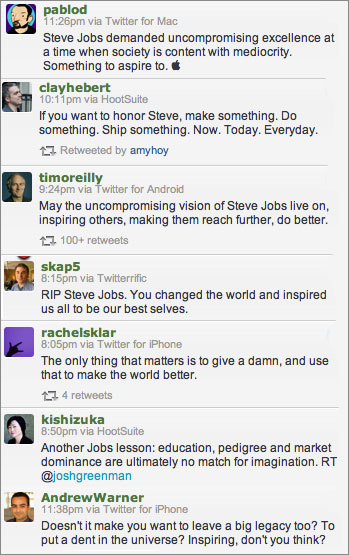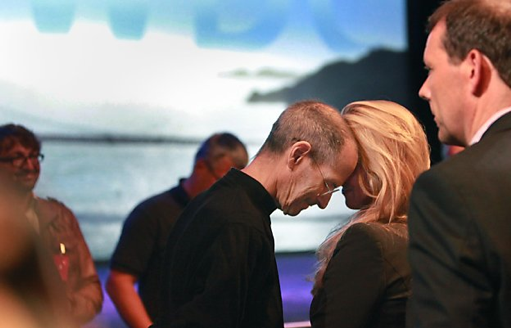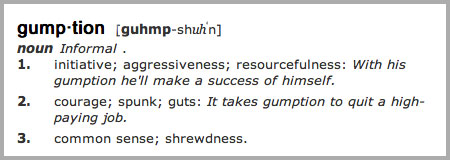I am inspired by those who put themselves out there. Those who take a risk in order to create something of meaning.
Most of us feel that way, but we tend to focus more on those who put themselves out there and succeed, than those who did so, and failed.
This week has seen several large web companies putting themselves out there in order to find continued growth:
- Google+ opened its doors to everyone. The jury is still out with article after article describing it as either a wasteland or burgeoning community filled with engagement. Will it work? Who knows. But they are making bold choices.
- Netflix split itself in two, keeping the Netflix brand focused on the future: streaming video, while a new company takes over the slowly dying DVD portion of their business. Will it work? Who knows. But they are making bold choices.
- Facebook made massive changes to their platform this week. Will it work? Who knows. But they are making bold choices.
If we only reward bold choices that find success, then we effectively diminish our approval for taking a chance on what you believe in. If taking risks is only allowed when we are assured success, then it really isn’t a risk at all.
Inherently, an action of choice means that you will likely be making someone happy, and pissing someone else off.
Putting yourself out there is only bold if there is a chance you will fail.
You know, embarrassing, ego-reducing, shameful, the-seed-that-launches-a-thousand-therapy-sessions, FAILURE.
Or…
Your idea will work and you could be seen as a brilliant visionary.
Even when we reduce the ACTUAL risk of failure, oftentimes we can’t reduce our perceived risk of failure. This is why your best friend in 8th grade would swear to you they were going to fail a quiz, only to have them get a 98%, while you were happy with an 84%.
Or we stay in the jobs we HATE because we can’t imagine who else will hire us for the salary we want. It’s easy to justify inaction with sweeping vague excuses: “If only the economy were better.”
Or we stay in unhealthy relationships for similar reasons.
This is why we write books, and leave them in drawers.
Why we are boastful of how WE would run Facebook (or do someone else’s job), when we may be stuck in a role we don’t like, and unable to take a risk to get out of it. It’s easy to be a backseat driver, a sideline quarterback. All reward. No risk.
I have been obsessing about the value of online video recently – about putting yourself out there on a site such as YouTube, and speaking to authors I work with about the pros and cons of leveraging it. I recently interviewed author Jackson Pearce, whose use of video is astounding to me. Simple. Yet astounding.
People will give you a thousand reasons that they won’t do video:
- “There’s no ROI in it.”
- “I don’t have a webcam.”
- “I have no time.”
And while these things may be very true, there are often other answers that go unspoken:
- “I have a zit on my forehead.”
- “I am in denial about my receding hairline.”
- “I have a lisp.”
- “I would, after I lose 20 pounds.”
- “I’m scared that I will sound like an idiot.”
- “I’m scared no one will care.”
All of this applies to the things I mentioned above: why we stay in broken relationships, careers, and leave those big ideas in the to-do list. Undone. If we aren’t honest about what keeps us from taking risks, then how will we ever overcome them to reap the rewards that we dream about?
That, inherent in this, is accepting what we don’t know, and taking action anyway. Accepting what we look like, and taking action anyway. Of accepting that we don’t have a perfect plan, but take action anyway. How can we each put ourselves out there? Every day we are confronted with opportunities to do so.
We can speak up at work. Not with complaints, but ideas. That you can’t kill someone else’s idea without presenting your own alternative. In many work environments, there is the perception that when you speak up, you put your head on the chopping block. That you are taking a risk, and even though you could be rewarded, you could also be punished. That speaking up only leads to more work.
We can put ourselves out there in deciding where we put our resources. I remembers some quote like this: “What you do is who you are“. Meaning that if you write every day, then you are a writer. If you just keep planning to write, but never do, then maybe you AREN’T a writer. So where you put your time, where you put your money, this is a critical way that you put yourself out there. We each have limited amounts of both. And we sometimes use that as an excuse for inaction.
“I can’t afford it.”
“I have no time.”
So we stay with what we have. We don’t take the risks, because we don’t feel we have the luxury of doing so. Action is not a luxury. It’s simply a choice. How you leverage your resources is part of this. It is not easy. Success often looks easy and obvious after the fact. That’s because we didn’t see the hard choices that a person made at the beginning, when nothing was promised, when they took a real risk.
One of my favorite quotes: “Caring is a powerful business advantage.” (thanks Scott Johnson!)
Your motivation and level of caring is another big way we can put ourselves out there. Caring. Some people find it embarrassing. In many circles, it is cool to act jaded and say snippy ironic things. I don’t get that. Or if I once did, I am over it.
I’m bored of irony. I am bored of jaded. You know what I admire? A Richard Simmons-esque level of excitement over something. A level of excitement that leads to action. That we are not embarrassed to care, to take action, to put ourselves out there.
None of this is physical: what you wear, how you do your hair, what car you drive, what size latte to buy, and whether or not you want “drizzle” on it. (Yes, I am writing this at Starbucks.)
This is one of the lessons of the recession. A Tom Robbins quote I’ve used in the past: “Should you fail to pilot your own ship, don’t be surprised at what inappropriate port you find yourself docked.”
That yes, we are a society, a culture, a community. Yes, we have obligations to family, jobs, schools, friends, and other affiliations.
But…
That as individuals, we are the only ones who can choose to take a risk that builds a life we want. No one will take the risk for you.
That was the lesson of the last (much smaller) recession. When the dot com bubble burst, many folks sat back and laughed at those trying to make millions selling dog food over the internet. When it all crashed and burned, they said: “Ha! I was right. You were crazy. Back to our regularly scheduled programming.”
But some individuals didn’t say that. They worked quietly – building. Separating the BS from the value of what the web could provide. They created YouTube and Facebook and Twitter and others and reshaped culture and business in ways that we are still only comprehending. People call it the “tech” space. But it was not the technology that did it. It was people. People who took a risk.
Some people won.
Some lost.
Many who lost tried again and won… eventually.
But they didn’t sit on the sidelines thinking up witty commentary. They got in the game of their OWN life.
These are the people who inspire me. Those who are – in small ways – making choices and taking risks. These are the people I interview every week. Some recent examples:
- Jackson Pearce – who I mentioned above, with how much she connects with her fans via video.
- Heather McCormack – curses like a pirate and has strong views on the role of libraries.
- Bob Mayer – sharing financial numbers that few others do about ebook sales, promoting it as an empowering option for writers.
- Richard Nash – He spent more than a year taking a risk to build a new type of publisher. Did it all work? Nope. Are we better off for him trying? YES!
- Joe Pulizzi – A colleague who has been an entrepreneur for several years now, and just held his first HUGE conference in Cleveland. Hundreds of people attended and loved it.
- Jenny Blake – Is helping people “Make Sh*t Happen” (literally, that is the name of her program) and being painfully honest of her process, her ups, her downs.
And there are so many others. These are just regular people, taking risks to build something they believe in.
This is the challenge we each wake up to every day, whether we know it or not. To take action or just be a cog in someone else’s machine. There are no easy answers here. It’s a challenge I try to live up to. My wife and I made some HUGE decisions in the past year. I started a business (leaving a cushy corporate life), we had a kid, and my wife quit her awesome job as a tenured art teacher. (you can read about it all here)
If I can help you take a risk that brings you closer to your dreams, just let me know.
Thanks!
-Dan








